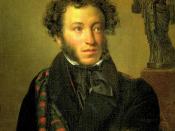Russians hold Pushkin in such high esteem that his place in Russian literature can reasonably be compared to that of Shakespeare in the literatures of the English language. Pushkin's literary genius seems to have been almost limitless: in addition to the long narrative and short lyric poems for which he is most famous, he also wrote short stories, stage plays and literary criticism. His letters are among the best in European literature. Many literary historians believe that the legend which suggests the composer Salieri may have murdered Mozart can be traced back to Pushkin's play MOZART AND SALIERI. (It is worth noting here that the great nineteenth-century Russian composer, Rimsky-Korsakov, wrote a successful opera based on the play in 1898; and both the play and the opera would later inspire the British playwright Peter Shaffer in writing AMADEUS). Pushkin's short stories--such as "The Queen of Spades," upon which Tchaikovsky based his great opera "Pique Dame"--are the first great works of prose fiction in Russian to stand the test of time unshakably.
His most widely read masterpiece, the verse novel EUGENE ONEGIN, is the source for another magnificent Tchaikovsky opera by the same name, as well as several ballets. Sections of this epic Romantic poem in novel form are still memorized by Russian and other Eastern European school children as reverently as if they were verses from the Bible.
Pushkin was the first giant to achieve a truly international status while working in the Russian language, although, ironically, his great fame beyond the borders of Russia came later than that of others who would follow him: Tolstoy, Dostoyevsky and Turgenev, all of whom owed a great deal to Pushkin as their literary progenitor, were known throughout Europe and America before Pushkin's works were widely read outside the Russian homeland. He...


